
Finding the Best Startup Consultant: Essential Tips for Entrepreneurs
November 24, 2025 / Bryan ReynoldsTakeaways
- Startup consultants provide expertise in areas like business strategy, marketing, finance, and operations to help new businesses overcome challenges and grow faster
- They charge between $75-$200 per hour, depending on experience and location
- Services include business plan development, market research, fundraising assistance, operational optimization, and strategic planning
- Hiring a consultant is most beneficial during pre-launch planning, fundraising rounds or rapid scaling periods
- The right consultant should have industry experience, track record with similar startups and clear communication skills
In today’s business world, it’s no secret—90% of startups fail in the first few years. While many factors contribute to this high failure rate, lack of specialized expertise and strategic guidance is consistently one of the top reasons new ventures can’t scale sustainably. That’s where startup consultants come in to fill the knowledge gaps and provide the expert guidance that can make the difference between success and failure.
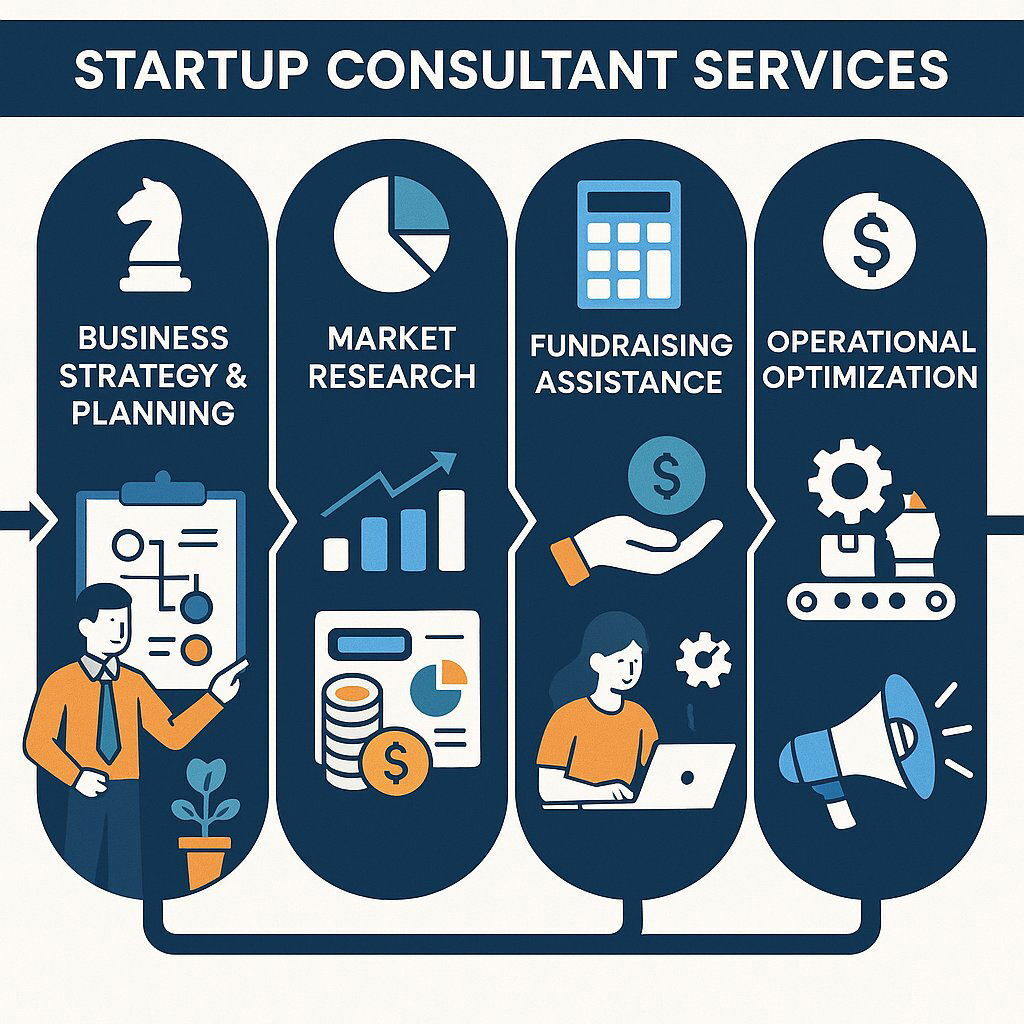
Whether you’re a first-time entrepreneur or a seasoned business leader launching a new venture, knowing when and how to work with startup consultants can make all the difference to your company’s trajectory. This guide will walk you through everything you need to know about hiring the right consultant for your business.
What is a Startup Consultant?
A startup consultant is an external expert who provides guidance to early stage startups and emerging companies during their most critical growth phases. They bring deep expertise in specific business functions to help entrepreneurs navigate complex challenges that require knowledge beyond the founding team’s capabilities.
Unlike traditional business consultants who work with established companies, startup consultants understand the unique constraints and fast-paced decision making environment of new ventures. They’re skilled at working with limited resources, tight timelines, and high uncertainty that defines the startup space.
Startup consultants are different from other types of business advisors:
Employees: Consultants work on specific projects or timeframes without long-term employment commitments, perfect for budget conscious startups.
Advisors: While advisors often provide ongoing strategic input in exchange for equity, consultants deliver specific, hands-on work for defined compensation.
Board Members: Board members provide governance and high-level strategic oversight, whereas consultants provide operational guidance and implementation support. Most successful startup consultants come from diverse backgrounds—including former entrepreneurs who’ve built and sold companies, corporate executives with deep functional expertise, and industry specialists who understand specific market dynamics. This varied experience allows them to offer practical insights that combine strategic thinking with real world implementation knowledge.
Core Services Offered by Startup Consultants
Top startup consulting firms and independent consultants offer a wide range of services to address the most common challenges facing innovative startups. Knowing these core service areas will help you identify what your business needs most.
Business Strategy and Planning
Strategic planning is the foundation of most consultant engagements. Consultants help founders develop a comprehensive business model that defines value proposition, target customers and revenue streams. This often includes market validation research to ensure product-market fit before investing in development or marketing.
Market analysis is another critical component where consultants conduct competitive research and identify market trends that can impact business growth. They help startups understand their total addressable market (TAM) and develop strategies to capture meaningful market share.
Effective consultants create detailed go-to-market strategies that outline how startups will reach customers, price products, and scale sales. These roadmaps cover 12-24 month periods and include specific milestones and metrics to measure progress.
Financial Management and Fundraising
Financial planning expertise is invaluable for most early stage startups, especially those preparing for investment rounds. Consultants help develop realistic financial projections, cash flow models, and budgeting frameworks that demonstrate fiscal responsibility to investors.
Fundraising support is often the highest value service consultants provide. This includes creating a pitch deck, identifying the right investors for the company’s stage and industry, and preparing founders for due diligence. Many consultants leverage their networks to introduce investors and provide negotiation guidance during funding discussions.
Consultants also help with valuation analysis, helping founders understand how investors evaluate companies and structure deals that protect founder interests while attracting necessary investment capital. For early stage startups looking to maximize their runway and efficiently use capital, many experts recommend upskilling internal teams—especially in emerging areas like AI—versus hiring expensive outside specialists.
Operations and Technology
Operational efficiency becomes critical as startups start to scale. Consultants help design processes and workflows that can handle increased volume without a proportional increase in costs or complexity. This includes implementing quality control systems and setting up vendor relationships that support sustainable growth.
For technology-focused startups, consultants provide valuable guidance on technology stack selection—sometimes weighing strategic choices such as .NET vs. Node.js for backend frameworks to yield the best long-term outcomes. They also help with engineering processes and development methodologies that optimize product development timelines.
Many consultants specialize in helping startups prepare for rapid scaling phases, identifying potential bottlenecks and implementing solutions before growth creates operational challenges.
Marketing and Sales
Marketing strategy development is a core service area where consultants help startups identify their target audience and develop messaging that resonates with potential customers. This includes brand positioning work that differentiates companies from competitors and creates value propositions.
Digital marketing implementation has become increasingly important, with consultants helping startups optimize their online presence across multiple channels. This includes content marketing strategies, social media campaigns, and paid advertising programs to drive customer acquisition at sustainable costs.
Sales funnel optimization ensures startups can convert leads into paying customers efficiently. Consultants help design sales processes, train teams, and implement systems that track key metrics like customer acquisition cost (CAC) and lifetime value (LTV).
When to Hire a Startup Consultant
Timing is everything when it comes to maximizing the value of consultant relationships. Knowing when external expertise will provide the most impact helps startups make strategic decisions about resource allocation and consultant engagement.
Pre-launch Phase: Before bringing products to market, consultants can provide valuable guidance on business model validation and market research. This early stage support helps founders avoid common pitfalls and ensure they’re building solutions that address real market needs. Consultants can also help with initial business plan development and establish operational foundations that support future growth. To strengthen this phase, many startups turn to rapid prototyping and MVP development for quick validation.
Post-MVP Development: After developing minimum viable products, many startups benefit from consultant expertise in refining product-market fit and developing scaling strategies. This phase often requires specialized knowledge in customer development, market positioning, and growth optimization that founding teams may lack.
Fundraising Periods: Investment rounds are critical inflection points where consultant expertise can make a big difference. Whether preparing for seed funding, Series A, or later rounds, consultants help startups present a compelling case to investors and navigate complex negotiation processes.
Rapid Growth Phases: When startups experience rapid user or revenue growth, operational challenges often emerge that need immediate attention. Consultants can help manage scaling challenges, implement new systems and establish processes that maintain quality and efficiency during high growth periods. For technology organizations, this often means optimizing engineering processes and embracing approaches such as DevSecOps within the development lifecycle to maintain quality and security as pace accelerates.
Crisis Situations: When startups face major challenges or need to pivot their business models, experienced consultants provide objective perspectives and proven frameworks for navigating difficult transitions. Their external view can help identify solutions that internal teams might miss.
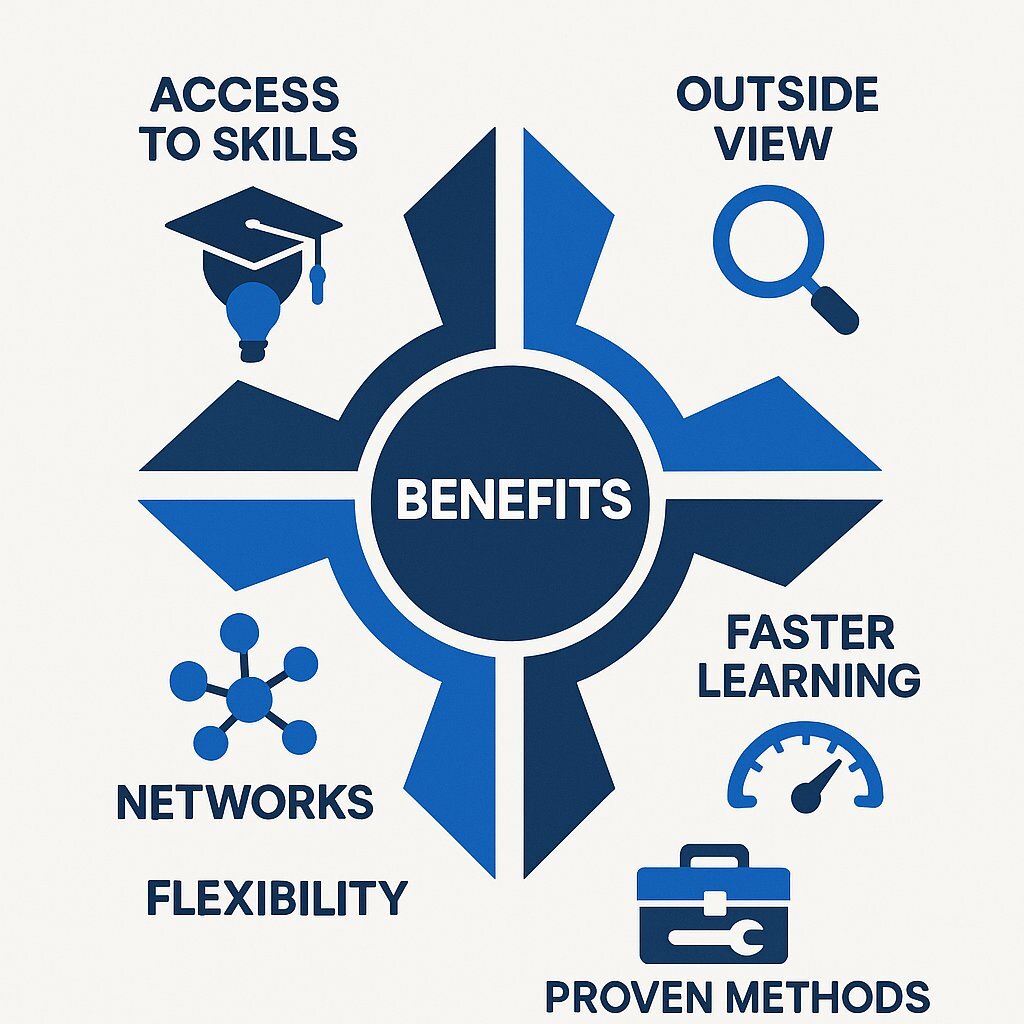
Specific Skill Gaps: Many successful startups hire consultants to address specific expertise gaps rather than waiting for general business challenges. For example, a technical founding team might engage marketing consultants early to develop customer acquisition strategies, or a business-focused team might hire technology consultants for product development guidance.
Why Work with Startup Consultants
Working with startup consultants has many benefits that can accelerate growth and improve success rates. Knowing these advantages helps founders decide when consultant investments will provide the most value.
Access to Specialized Skills: Startup consultants bring expertise in specific areas without the full-time employment commitment. This allows resource-constrained startups to access senior-level skills that would otherwise be too expensive or unavailable for their stage and budget.
Objective Outside View: Founders get so close to their original idea that it’s hard to see problems or alternatives objectively. Consultants provide an outside view that can spot blind spots and suggest strategies that internal teams might miss.
Faster Learning Curve: Rather than learning through trial and error, startups can leverage consultants’ previous experience with similar challenges. This reduces the time to implement effective solutions and helps avoid common mistakes that kill many new ventures. If your team is still operating on traditional methods, consultants may recommend adopting composable architecture or other flexible frameworks to drive agility and rapid learning.
Network Access: Established consultants have networks of investors, potential partners, and industry connections. These relationships can open doors that would be hard for startups to access independently, especially for investor or partnership introductions.
Flexibility and Scalability: Unlike hiring full-time employees, consultant relationships can be adjusted based on current needs and budget constraints. Startups can engage consultants for specific projects, scale up or down based on results, and terminate relationships without the employment complexity.
Proven Methodologies: Experienced consultants bring tested frameworks and processes developed through work with multiple startups. Rather than creating everything from scratch, companies can implement proven approaches that have worked for similar businesses—such as employing Agile methodologies to accelerate delivery and boost flexibility.
Potential Drawbacks and Considerations
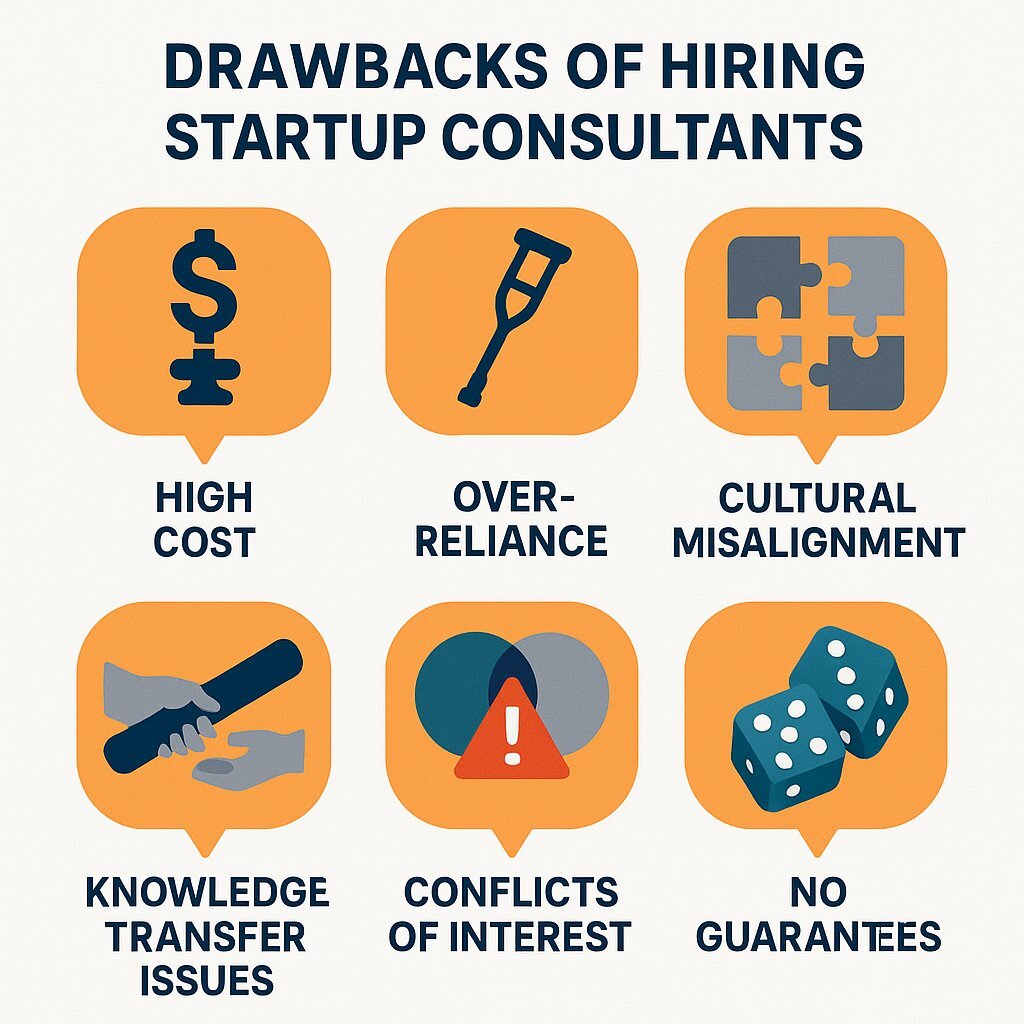
While startup consultants can be super valuable, founders should also consider the potential downsides and risks. Thinking through these factors helps ensure consultant engagements deliver expected results.
High Cost: Quality consultants charge high hourly rates that can eat into limited startup budgets. With rates ranging from $75-$200 per hour, comprehensive engagements can cost tens of thousands of dollars—a big investment for early stage companies with limited resources.
Over-Reliance: Some startups become too dependent on consultant expertise and limit their internal capability development. This dependency can cause problems when the consultant relationship ends and the team doesn’t have the skills to maintain progress or adapt strategies.
Cultural Misalignment: Consultants who don’t understand startup culture or company values may recommend approaches that conflict with the organization’s identity. This misalignment can cause internal friction and result in strategies that feel disconnected from the company’s purpose. Knowledge Transfer Challenges: The time spent educating consultants about business specifics, market dynamics, and internal processes can be significant. This onboarding investment may reduce the net value of consultant relationships, especially for shorter term engagements.
No Success Guarantees: Despite their expertise, consultants can’t guarantee outcomes. Market conditions, competitive dynamics, and execution quality all impact results so even great consultant advice may not deliver the desired business outcomes.
Potential Conflicts of Interest: Consultants working with multiple companies in the same space may have conflicts when serving competing startups. These situations can limit the depth of support they can offer or create concerns about confidential information sharing.
Pricing and Cost Structure
Understanding consultant pricing helps startups budget and choose the right compensation model for their financial constraints and project requirements. Different pricing models offer various benefits depending on engagement scope and duration.
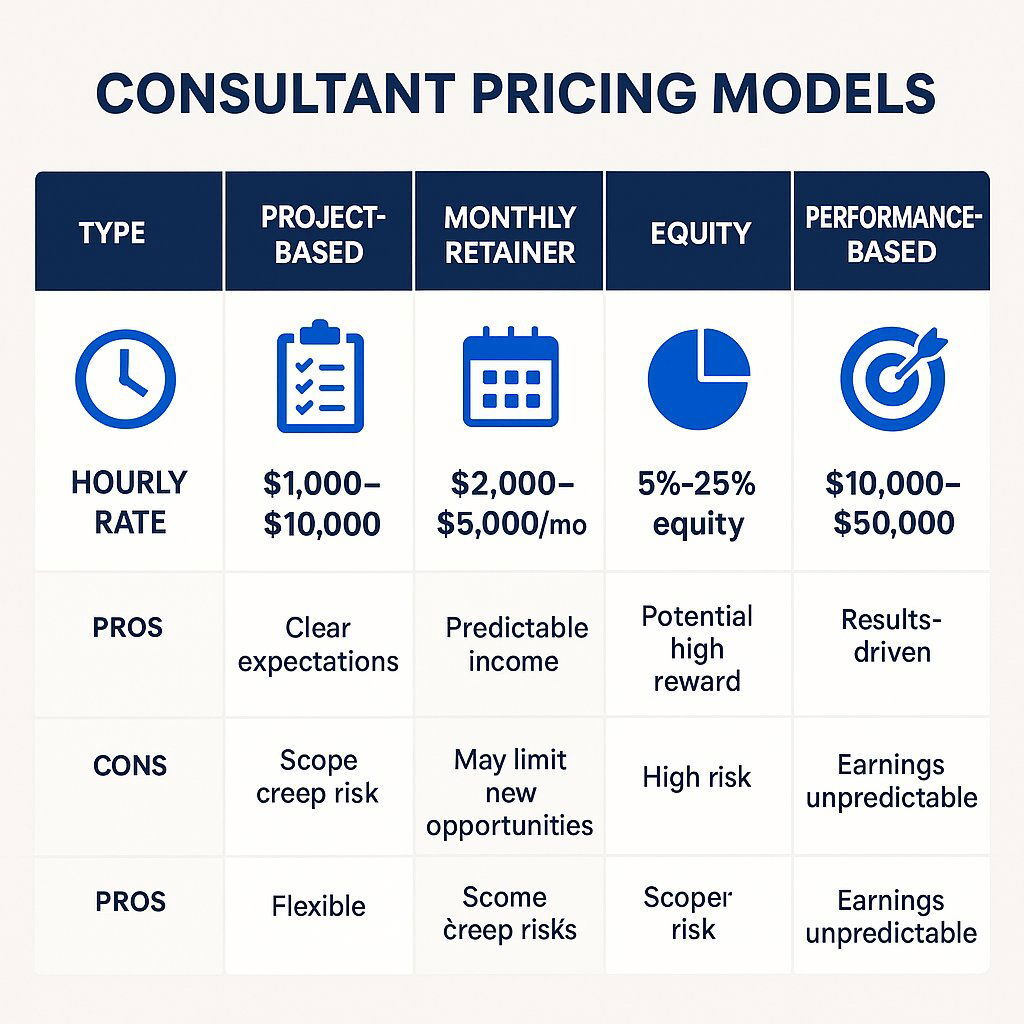
Hourly Rates: Most consultants charge hourly rates between $75-$200, with rates varying based on experience level, location, and specialization. Entry-level consultants or those in lower cost markets charge $75-$125 per hour, while senior consultants in major cities charge $150-$200 per hour.
Project-Based Pricing: For well-defined initiatives like business plan development or market research projects, many consultants offer fixed price engagements. These range from $5,000-$50,000 depending on scope and complexity. Project pricing provides budget certainty but requires clear definition of deliverables and timelines upfront.
Monthly Retainers: Ongoing strategic support often uses retainer models where startups pay $3,000-$15,000 monthly for access to consultant expertise. Retainers work well for companies that need regular guidance over an extended period and often provide better hourly rates than ad-hoc engagements.
Equity-Based Compensation: Some consultants accept equity compensation, typically 0.5%-2% for long-term strategic roles. This model aligns consultant incentives with company success but requires careful legal structuring and clear performance expectations. Equity arrangements work best when consultants contribute significant ongoing value rather than short-term project work.
Performance-Based Fees: Results-oriented pricing ties consultant compensation to specific milestones like fundraising, revenue targets, or user growth metrics. While attractive for cash-constrained startups, these arrangements require careful metric selection and clear success definitions to avoid disputes. Location Variations: Consultant rates vary significantly by location, with Silicon Valley and New York City commanding 30-50% premium pricing over other markets. Remote work capabilities have reduced the geographic impact but local market expertise often justifies location-based pricing.
How to Choose the Right Startup Consultant
Choosing the right consultant requires evaluating multiple factors to ensure alignment between company needs and consultant capabilities. A structured selection process increases the chances of successful engagements and positive outcomes.
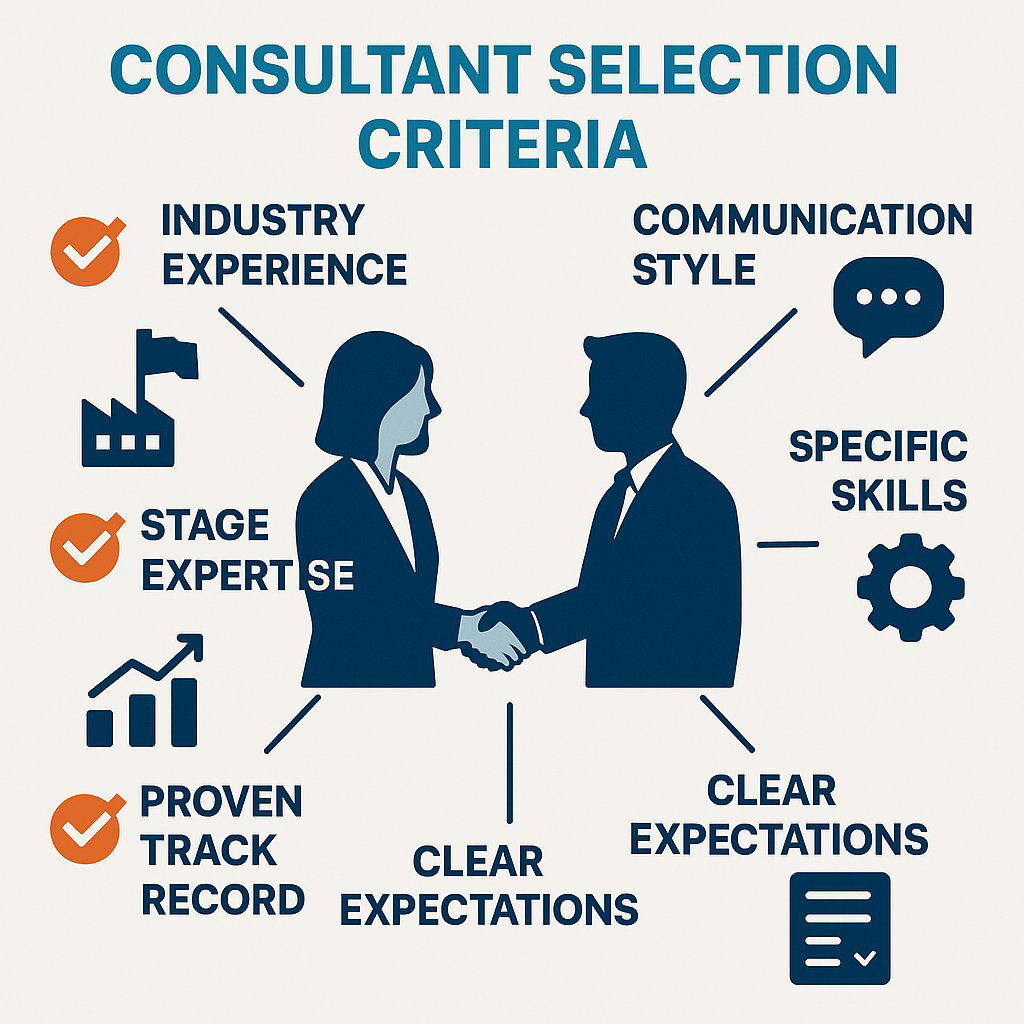
Industry Experience: Look for consultants with experience in your industry or similar business models. Understanding specific market dynamics, regulatory requirements, and customer behavior impacts the quality of strategic recommendations. Ask for case studies and references from companies facing similar challenges. If you’re a SaaS founder, consider a consultant with a background in transforming B2B software with AI or digital innovation.
Stage-Specific Expertise: Different startup stages require different types of support so ensure consultants have experience with companies at your current stage. Pre-seed consultants focus on validation and planning, while growth-stage experts understand scaling challenges and operational complexity.
Track Record: Request detailed information about previous client outcomes, including specific metrics and measurable results. Good consultants can demonstrate how their work contributed to client success through concrete examples rather than general testimonials.
Communication Style: Consultant-client relationships require frequent communication and collaboration so interpersonal fit is crucial for success. During initial conversations assess whether the consultant’s communication style aligns with your team’s preferences and working methods.
Specific Skills: Clearly define the skills you need and verify potential consultants have those specific skills. General business acumen may not translate into specialized knowledge areas like digital marketing, financial modeling, or technical product development.
Check References: Speak directly with former clients to understand consultant working style, deliverable quality, and overall satisfaction. Ask specific questions about communication frequency, deadline adherence, and post-engagement support availability.
Clarify Expectations: Before engaging any consultant, define clear expectations around deliverables, timelines, communication frequency, and success metrics. Written agreements should specify exactly what work will be done and how progress will be measured.
Top Startup Consulting Specializations
The consulting industry has evolved to include many specializations so startups can find experts who understand their specific needs and challenges. Understanding these specializations helps companies find the right consultant category for their situation. Industry Consultants: Many successful consultants focus on specific industries where they’ve developed deep expertise. Fintech consultants understand regulatory requirements and market dynamics specific to financial services, while healthcare consultants navigate complex compliance and reimbursement challenges. SaaS consultants bring knowledge of software business models and customer success strategies, while e-commerce specialists understand online retail optimization and digital marketing.
Functional Specialists: These consultants excel in specific business functions regardless of industry. Marketing consultants help develop comprehensive customer acquisition strategies and brand positioning. Operations specialists focus on process optimization and scalability planning. Technology consultants assist with product development and technical architecture decisions. Finance consultants provide expertise in financial modeling, fundraising, and investor relations.
Stage-Focused Experts: Some consultants specialize in particular startup phases, developing deep understanding of stage-specific challenges and opportunities. Pre-seed experts help with idea validation and initial business model development. Series A specialists focus on scaling challenges and preparation for significant growth phases. Growth-stage consultants understand operational complexity and market expansion strategies. Exit preparation consultants help companies prepare for acquisition or public offerings.
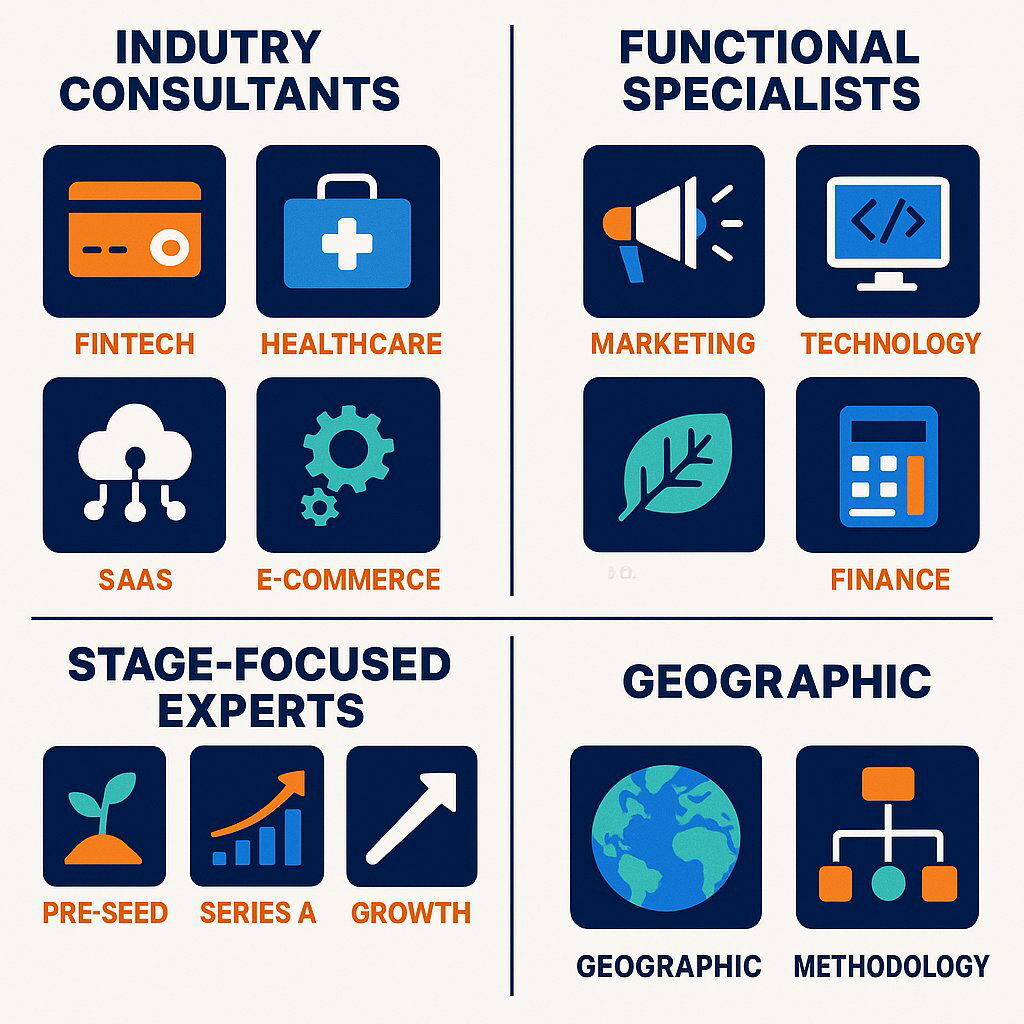
Geographic Specialists: International expansion often requires consultants with specific geographic expertise and established local networks. These specialists understand cultural differences, regulatory requirements, and market entry strategies for particular regions or countries. They can facilitate partnerships and provide insights that help companies avoid common internationalization mistakes.
Methodology Experts: Certain consultants specialize in specific business methodologies or frameworks. Lean startup practitioners help companies implement rapid experimentation and iterative development processes. Design thinking experts facilitate customer-centric innovation approaches. Agile development consultants optimize product development processes for speed and flexibility.
Understanding these specializations helps startups find consultants whose expertise aligns most closely with their immediate needs and long-term goals.
FAQ
How long will I work with a startup consultant?
Typical consultant engagements are 3-12 months depending on project scope and company needs. Short-term projects (1-3 months) work well for specific challenges like fundraising preparation, market research, or business plan development. Medium-term engagements (3-6 months) suit strategy development and implementation projects that require ongoing support and iteration. Long-term relationships (6-12+ months or longer) provide ongoing strategic guidance and scaling support, particularly during rapid growth phases or complex market expansion initiatives.
What’s the difference between a startup consultant and a business coach?
Startup consultants provide specific technical expertise and hands-on implementation support in areas like marketing strategy, financial modeling, or operational optimization. They deliver concrete outputs and solve specific business problems. Business coaches focus on developing leadership skills and personal growth of founders, emphasizing mindset development, decision making processes, and interpersonal effectiveness. While consultants bring deep technical knowledge in specialized areas, coaches concentrate on capability building and personal development that enables better leadership and strategic thinking.
Should I hire multiple consultants for different areas or one generalist?
Early stage startups often benefit from one experienced generalist who can address multiple needs and provide integrated strategic guidance. This approach reduces coordination complexity and provides consistent strategic direction. Growing companies facing complex challenges in specific areas like digital marketing, financial management, or international expansion may need specialists with deep expertise in those domains. Consider your budget constraints and management capacity when deciding between multiple specialists versus one generalist. Start with one trusted advisor who can help identify when additional specialists become necessary.
How do I measure the ROI of hiring a startup consultant?
Set clear, measurable goals before any engagement begins, such as specific revenue targets, user growth metrics, or successful fundraising completion. Track leading indicators like conversion rate improvements, customer acquisition cost reductions, or operational efficiency gains that demonstrate progress towards larger objectives. Compare key performance metrics before and after consultant involvement to quantify impact. Consider long-term benefits like improved processes, strategic clarity, and valuable network connections that may provide ongoing value beyond the immediate engagement period. Factor in time savings and opportunity costs of trying to solve complex problems without expert guidance.
Can startup consultants help with international expansion?
Many startup consultants specialize in international market entry and global expansion strategies, bringing expertise in regulatory requirements, cultural differences, and local market dynamics. International expansion consultants help identify target markets, assess competitive landscapes, and develop market entry strategies for specific geographic regions. They assist with partnership identification, local team building, and adaptation of products, marketing messages, and business models for new markets. For leaders whose ambitions extend beyond existing borders, articles like A CFO’s Playbook: Pragmatic AI Investment for Real-World ROI can offer valuable perspectives on risk management, data readiness, and scaling strategy. Look for consultants with specific geographic expertise and established networks in your target markets, as local knowledge and relationships prove invaluable for successful internationalization initiatives.
About Baytech
At Baytech Consulting, we specialize in guiding businesses through this process, helping you build scalable, efficient, and high-performing software that evolves with your needs. Our MVP first approach helps our clients minimize upfront costs and maximize ROI. Ready to take the next step in your software development journey? Contact us today to learn how we can help you achieve your goals with a phased development approach.
About the Author

Bryan Reynolds is an accomplished technology executive with more than 25 years of experience leading innovation in the software industry. As the CEO and founder of Baytech Consulting, he has built a reputation for delivering custom software solutions that help businesses streamline operations, enhance customer experiences, and drive growth.
Bryan’s expertise spans custom software development, cloud infrastructure, artificial intelligence, and strategic business consulting, making him a trusted advisor and thought leader across a wide range of industries.


